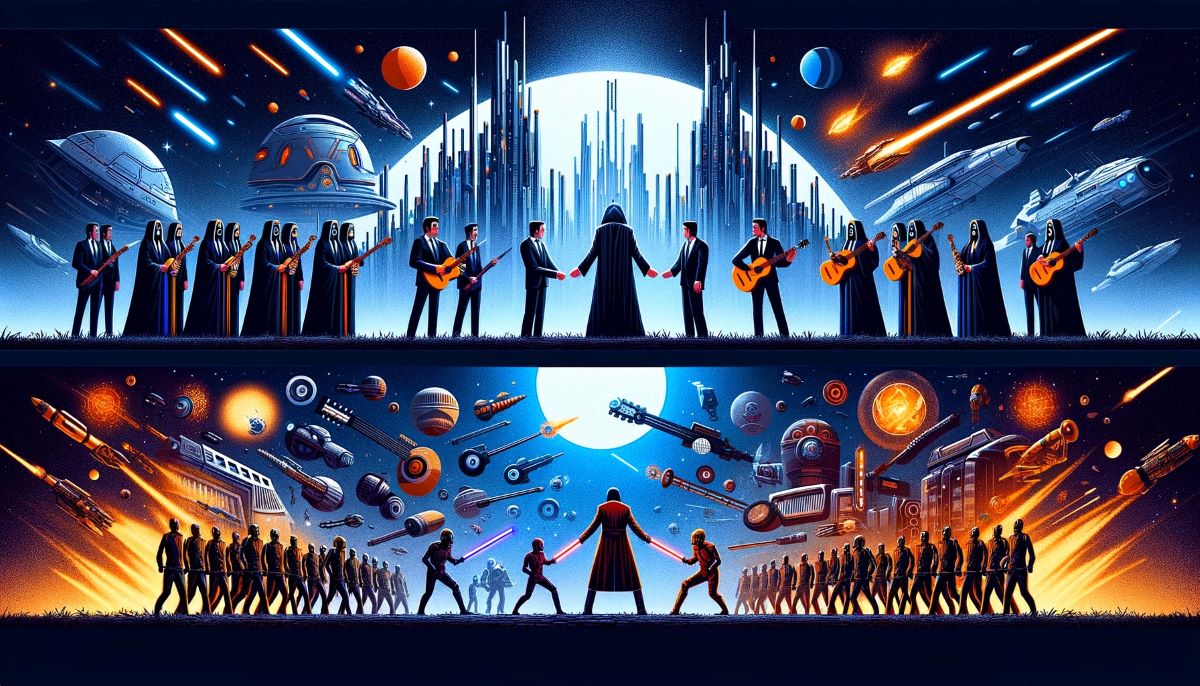The title “Star Wars” flashes across the screen, while the iconic crawl scrolls across your screen. In your ears you hear that familiar, and exhilarating… silence!? Not quite the same, is it?
- Universal Music Group has removed their music from TikTok.
- The removal stems from a dispute between the two companies over AI and royalty payment rates.
- TikTok can pay artists as much as 100 times less than other platforms.
- It’s unclear how this high-stakes battle will ultimately play out and how this could affect investors.
What Happened Between TikTok and UMG?
Welcome to Music Wars. On many levels, nothing here is new, though the battlegrounds have changed considerably over the past few years.
Universal Music Group (UMG) recently took what may be seen as a dramatic step by many. They pulled their songs from TikTok. Drake, Taylor Swift, the Weekend, and more are now unavailable on the platform.
As Billboard reports, the impact is even broader than you might first expect. Artists such as Harry Styles will have their music removed from the platform, despite having never recorded for UMG.
The reason? The songs are written, in part, by UMG Songwriters. As the article details, this means the impact will be very wide and felt across multiple publisher’s catalogs.
What Caused The Dispute?
Media companies feuding over pricing, fees, and contracts is nothing new. Disney and Charter communications recently had a dispute that resulted in ESPN and other Disney channels being unavailable on the carrier (this was eventually settled in September).
So, what is the cause of UMG’s new battle with TikTok? Here’s what the company shared in an open letter (emphasis ours):
…[W]e have been pressing [TikTok] on three critical issues—appropriate compensation for our artists and songwriters, protecting human artists from the harmful effects of AI, and online safety for TikTok’s users.
Universal Music Group
I’m not the right person to speak about the safety of TikTok’s users, though I will note that TikTok and other social media companies just had their CEOs testify to congress on child exploitation.
So, instead we’ll focus on the other two.
How Much Does TikTok Pay Artists?
Let’s start by understanding the compensation that TikTok currently provides. This can vary between labels and companies based on the specific agreements, but we have some reference points from a Billboard article on the topic for late 2022.
Here’s some of what they found from talking to different people within the industry:
- <$5000 from 500K videos and billions of views
- $8 for every 1 million views
- $100 after being used in 60,000 video clips
- $350 after being used in over 80,000 video clips
As a reference, according to the piece, artists typically see about $500 to $2000 for 1 million views on YouTube. So, $8 is more than 100X less than YouTube, which isn’t known for its generous royalty rates.
At the heart of the debate on payments to artists is what TikTok really is. The company insists it’s a social video platform and not a music service – so, while the music does add value to videos, it’s not essential to it.
On the other hand, music companies argue that many people are consuming music through the platform. Some people even have music playlists through the service and are going to TikTok over other, traditional streaming services.
Concerns Over AI And Copyright
In December we wrote about AI and whether or not that would threaten music royalties. I generally lean towards it being a valid concern, but not currently an existential threat.
Of course, I’m not the only one worrying about this. UMG cited this as one of their 3 concerns with TikTok. It doesn’t help that one of the most famous examples of an AI-generated song going viral (Heart on My Sleeve) happened on TikTok.
The AI dynamics are complicated, but I believe there are two main concerns here.
1) The simplest concern is that users listening to an AI copycat song would have otherwise listened to a legitimate song, thus reducing creator revenue. These copycat songs can also cause potential brand and image damage, depending on the content.
2) The other issue is around “crowding out” legitimate artists. Let’s assume for a moment that no AI-generated songs directly copy an existing artist. If people can generate tens of thousands of passable, middle-of-the road results with AI, then it makes it far harder for human creators to have their songs discovered.
Impact And Potential Outcomes
So, how might this play out?
If TikTok is indeed paying royalty rates two orders of magnitude below what other video streaming services offer, it’s hard to imagine them ever paying a “standard rate.” There is simply no way TikTok can agree to 100X one of their expenses. Especially when they do not see that music as core to their service.
That leads me to believe a huge success for UMG would be managing to 10X payments, though even that sounds far fetched. The question mostly comes down to – who has the leverage here?
UMG’s open letter seems (to me) clearly intended to unify the industry against TikTok and provide them a common set of talking points to use across a myriad of different contract discussions. Certainly, having more companies pulling their songs from TikTok will create more pressure on the company to respond to the demands of the music industry.
If music turns out to be core to the TikTok experience and they start seeing meaningful attrition and declining user engagement metrics, then the needle could sway more towards a “landmark” win for UMG (which again, I think is realistically limited at far below the payout benchmarks of other services).
UMG’s High-Stakes Strategy
However, this strategy could backfire. If TikTok is completely unfazed by the absence of these popular songs, then they will have very little incentive to meaningfully compromise – especially if public opinion places the blame on the artists and music industry.
Actually, in the absence of UMG’s library, it could create more room for AI-generated music to make further waves. While UMG can counter by sending take-down requests for anything they believe is copyright infringement, TikTok can drag its feet on these requests.
The more combative the relationship between the two organizations becomes, the less upside there is for TikTok to respond at anything beyond the minimum required speed.
TikTok could also elect to not respond at all, forcing UMG to draw them into an expensive and high-stakes court battle over thorny topics like who really owns the rights to the use of the likeness of an artist’s voice.
Of course, the simplest outcome is that the two sides reach an agreement.
Maybe payments are doubled or tripled and TikTok makes some vague promises to more proactively moderate the use of unsanctioned AI-generated music on the platform.
From there UMG tries to play it as a major win for artists and for its business. TikTok then emphasizes publicly that it shows its continued support for artists and leans into selling the platform as a major win for artist and music discovery. Privately TikTok can explain how it doesn’t affect the core economics of the platform and they still got a “good deal” in relation to all the other streaming services on the market.
How Others Are Responding
Starting from May, the battle over the core issues underlying the dispute is set to expand. The National Music Publishers Association does not intend to renew their license agreement with TikTok. This will remove even more music from the video platform.
The content on the platform is also changing as well. While songs have disappeared, there are now more videos with “decontextualized audio” (phrases, comments, etc… taken out of context) have been emerging.
Conclusion
Given how little money is earned from TikTok royalties, regardless how this plays out, this seems unlikely to meaningfully affect music royalty investors.
The best-case scenario for investors is likely that the music industry extracts greater payouts from TikTok and secures some enhancements related to AI. That should be purely a net-positive, even if only to a small degree.
The more dramatic and litigious this becomes, the more risk there is to the asset class.
I think a court ruling that opens the doors for technically legal songs from generative AI “singers” to use the vocal likeness of major artists is the worst-case scenario. Though that scenario would likely take years to unfold in the courtroom. So even the impacts from that could be far-off.
Frequently Asked Questions
Originally sent to newsletter subscribers on February 5th.

